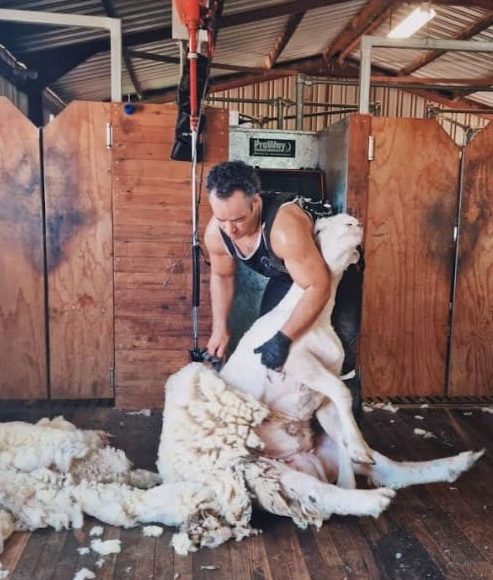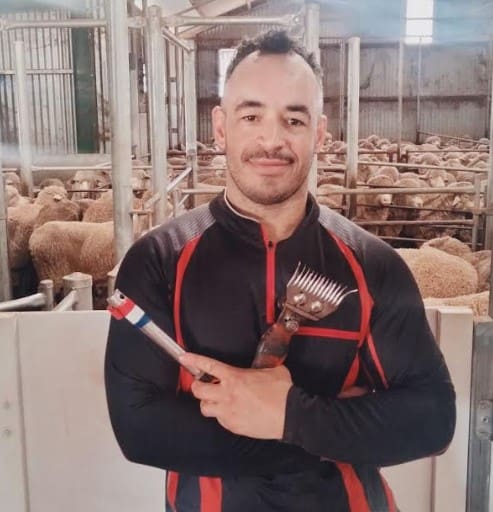
Nicolas Hardy shearing the rams.
ALL French sheep shearer Nicolas Hardy wants for Christmas is to stay in Australia and keep working.
The former French naval officer and polo horse trainer is working hard to pursue his latest profession in Australia – sheep shearing.
The 35 year-old arrived in Australia about 4.5 years ago to work at the Garangula Polo Club near Harden in New South Wales. Before coming to Australia he was working as a cowboy in Canada.
“I’ve had a pretty adventurous life.
“Now I would like to be the best French shearer in Australia.”
Like other foreign workers in the industry – shearers and wool handlers – Nicolas has helped sheep farmers harvest wool through a labour shortage aggravated by COVID-19 outbreaks. But like many shearing industry workers from various countries including France, Ireland, Scotland and England he is running out of visa options to keep working in Australia.
Nicolas has outlaid about $4000 with an immigration agent to help with advice and documentation to stay in Australia, such as income tax records, transcripts of his French primary school and university qualifications – including a Masters in International Relations — and his Certificate III in shearing.
But Nicolas is being frustrated by the lack of appropriate long-term visa options.
“Funny fact, it was requested that I work for Lochie Robertson (Riverina Livestock Scan and Shear) for three years…well 24 April 2024 will be the anniversary of my third year working for Lochie and my visa expires on 22nd of February 2024 – ironical.”
Nicolas initially came into Australia in 2018 as a backpacker on a Working Holiday Visa to embrace a career as a polo horse trainer and player, but when COVID struck in 2019 and the sport was shut down he was introduced to shearing by a polo player.
“I sought a career change and I registered and attended my first SCAA shearing school in July, 2020 at Barunah Plains in Victoria.
“From the first blow, I was hooked and began planning a long term career in the shearing industry.”

Nicolas would be happy to stay in Australia and keep shearing.
He has undertaken shearer training with SCAA Shearer Woolhandler Training and Australian Wool Innovation to Certificate III level and has been mentored by several of Australia’s leading trainers. He can shear up to 150 Merino ewes or 200 crossbred ewes a day. But all this has not helped him and other European shearers stay in Australia.
“My problem is, having jumped through every hoop requested of me by the Department of Immigration, and despite many discussions with immigration agents, I am being refused an immigration pathway,” Nicolas said.
“I have passed the English proficiency test only to find that shearing is not listed as highly skilled or specialized work on the visa occupations list.
“So unfortunately, after three years, passing Certificate III and continuous employment in the shearing industry we (foreign shearers) are still struggling to get the recognition as being in a ‘highly skilled occupation’ and get into a permanent residence visa to keep shearing and counter the consistent shortage of shearers,” he said.
“Shearers from France, England, Scotland and sometimes other countries, we fell in love with the job and have been followed by your amazing trainers all these years.
“But in less than three months I will run out of visa to stay and shear in the country.”
Last month, Nicolas returned from Western Australia in his search to find a regional area sponsor to stay in Australia and apply for permanent residency, or else he will be forced to leave on 22 February 2024. He has also written letters to industry leaders in every state in his sponsor search.
Nicolas is currently in Australia on the 12-month 417 visa, but he said the rules currently require him to have shorn for the same shearing contractor for three years to qualify for the 494 Sponsorship Visa.
“But this is an impossibility – I’m facing a real challenge.
“I would like to stay as a shearer in Australia.”
Nicolas is currently based in Wagga Wagga in New South Wales and working for Lochie Robertson’s Riverina Scan and Shear. He said at least three contractors were willing to sponsor him, but there have always been complications.
Nicolas said he was attracted to the challenge in shearing and the lifestyle of travelling to different sheds.
“Every day you have to challenge yourself to do better.
“I can see more than I would as a tourist.”
Nicolas said there are several other foreign shearers and wool handlers in a similar position to him, from England, France and Wales.
“We are facing so many difficulties with immigration.
“The visas are not fit for the shearing industry at all, they don’t even recognise the effort made.”
Balancing demand and supply
SCAA chief executive officer Jason Letchford said SCAA has been pushing to have shearing added to the Short-term Skilled Occupation List (STSOL) so that it would be ‘more eligible’ for the 400 Short-Term Skilled Visa.
“This is generally a 90-day visa, which makes good sense for such a seasonal industry, better than the 494 which is the only visa shearing is eligible for.”
Mr Letchford said the fluctuations in demand for shearers highlights the need for a 90-day visa, “where workers would come when it’s busy and have to leave when it’s not, ensuring better employment prospects for domestic shearers in the shoulder and lower demand periods.”
Mr Letchford said providing an immigration pathway for foreign-born shearers like Nicolas to stay and work for longer periods and potentially gain permanent residency is a balancing act for the Federal Government “to firstly ensure the all resident workers are fully employed in the low seasons of the industry while also have enough shearing workers available in the two peak periods of the year.”
“Last year there was a record number of immigrants entering Australia and the Federal Government is under pressure to lower this number.
“Nicolas and many others from the shearing sector are now caught in the ‘cross-fire’.”
Mr Letchford said the situation for foreign-born workers has come to the fore as the COVID-extension visas are all coming to an end for the holiday maker visa holders like Nicolas.
“It’s a great shame to lose such quality workers that the government, Industry and employers have invested in.”
Australian Wool Innovation recently released a video promoting the wool industry as an option for overseas visitors.
Mr Letchford said it is frustrating but the industry has to keep pushing the ‘demand’ or promotional side and the ‘supply’ side, dealing with the government’s policy settings.
“We can’t afford to pause these efforts otherwise we will be going backwards,” he said.

What a sad state of affairs. Could the IWTO could lend a hand here to help open up a pathway?
Nicko is a good hard working fella. Let him stay. At least he works and is not looking for a hand out.
Great shearer, great bloke. Australian systems lack responsiveness to Australian farmers needs; when as a farmer you see a need for experienced expert sheep handlers who minimise the stress on our animals and complete the job with such finesse as to leave the industry over unresponsive rules are such a waste of talent, expertise and it’s just plain wrong.
Change the immigration system to accommodate professional shearers: that’s the solution.